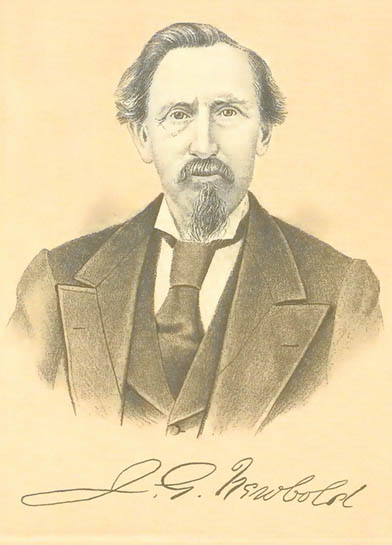 |
JOSHUA G. NEWBOLD, the ninth Governor of Iowa, is a native of Pennsylvania. He comes from that excellent stock known as the Friends, who very early settled in New Jersey. Joshua G. is the son of Barzilla and Catherine (House) Newbold, and was born in Fayette County, May 12, 1830. He was born a farmer's boy and reared in the vigorous employment of farm work. When he was eight years of age the family moved to Westmoreland County, Pa., where, in the common schools and in a select school or academy, young Newbold received his education. When sixteen years of age he accompanied the family on the return to Fayette County. Here for the following eight years he assisted his father in running a flouring-mill as well as devoting much of his time to teaching school. When about nineteen years of age our subject began the study of medicine, devoting much of his time while teaching to his medical books. He, however, abandoned the idea of becoming a physician and turned his attention to
different walks in life.
In the month of March, 1854, Mr. Newbold removed to Iowa, locating on a farm, now partly in the corporation of Mount Pleasant, Henry County. At the end of one year he removed to Cedar Township, Van Buren County, there merchandising and farming till about 1860, when he removed to Hillsboro, Henry County, and pursued the same callings.
In 1862, when the call was made for 600,000 men to finish the work of crushing the Rebellion, Mr. Newbold left his farm in hands of his family and his store in charge of his partner, and went into the army as Captain of Company C, 25th Regiment of Iowa Infantry. He served nearly three years, resigning just before the war closed, on account of disability. During the last two or three months he served at the South he filled the position of Judge Advocate, with headquarters at Woodville, Ala.
His regiment was one of those that made Iowa troops famous. It arrived at Helena, Ark., in November, 1862, and sailed in December following on the expedition against Vicksburg by way of Chickasaw Bayou. At the latter place was its first engagement. Its second was at Arkansas Post, and there it suffered
severely, losing in killed and wounded more than sixty.
Afer Lookout Mountain it joined in the pursuit of Bragg's flying forces to Ringgold, where it engaged the enemy in their strong works, November 27, losing twenty-nine wounded. The following year it joined Sherman in his Atlanta Campaign, then on the famous march to the sea and through the Carolinas.
On returning to Iowa he continued in the mercantile trade at Hillsboro for three or four years, and then sold out, giving thereafter his whole attention to agriculture, stock-raising and stock-dealing, making the stock department an important factor in his business for several years. Mr. Newbold was a member of the 13th, 14th and 15th General Assemblies, representing Henry County, and was Chairman of the School Committee in the 14th, and of the committee on appropriations in the 15th General Assembly. In the 15th (1874) he was temporary Speaker during the deadlock in organizing the House. In 1875 he was elected Lieutenant Governor on the Republican ticket with Samuel J. Kirkwood.
His Democratic competitor was E.D. Woodward, who received 93,060
votes. Mr. Newbold received 134,166, or a majority of 31, 106. Governor Kirkwood being elected United State Senator during that session, Mr. Newbold became Governor, taking the chair Feb. 1, 1877, and vacating it for Gov. Gear in January, 1878.
Gov. Newbold's message to the Legislature in 1878, shows painstaking care and a clear, business-like view of the interests of the State. His recommendations were carefully considered and largely adopted. The State's finances were then in a less creditable condition than ever before or since, as there was an increasing floating debt, then amounting to $340,826.56, more than $90,000 in excess of the Constitutional limitation. Said Gov. Newbold in his message: "The commonwealth ought not to set an example of dilatoriness in meeting its obligations. Of all forms of indebtedness, that of a floating character is the most
objectionable. The uncertainty is to its amount will invariably enter into any computation made by persons contracting witht State for supplies, material or labor. To remove the present difficulty, and to avert its recurrence, I look upon as the most important work that will demand you attention."
One of the greatest problems before statesmen is that of equal and just taxation. The following recommendation shows that Gov. Newbold was abreast with foremost thinkers, for it proposes a step which yearly finds more favor with the people: "The inequalities of the personal-property valuations of the several counties suggest to my mind the propriety of so adjusting the State's levy as to
require the counties to pay into the State treasury only the tax on realty, leaving the corresponding tax on personalty in the county treasury. This would rest with each county the adjustment of its own personal property valuations, without fear that they might be so high as to work injustice to itself in comparison with other counties."
Gov. Newbold has always affiliated with the Republican party, and holds to its great cardinal doctrines, having once embraced them, with the same sincerity and honesty that he cherished his religious sentiments. He has been a Christian for something like twenty-five years, his connection being with the Free-Will Baptist Church. He found his wife, Rachel Farquhar, in Fayette County, Pa., their union taking place on the 2d of May, 1850. They have had five children and lost two. The names of the living are Mary Allene, Emma Irene and George C.
The Governor is not yet an old man, and may serve his State or county in other capacities in the coming years.
|
